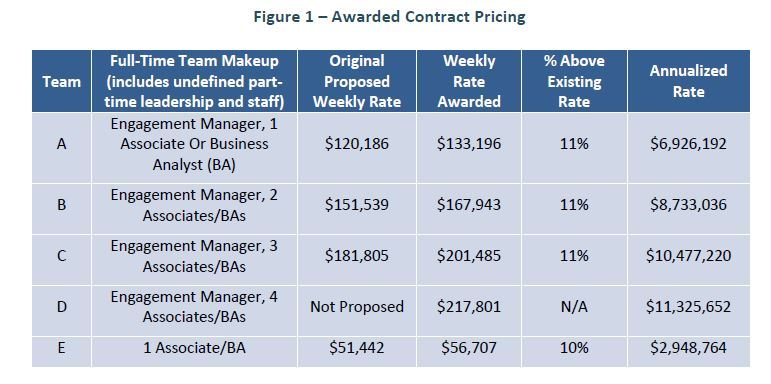
Are GSA’s IG recommendations to cancel McKinsey’s schedule contracts too harsh?
The General Services Administration’s inspector general recommended the Federal Acquisition Service cancel two of McKinsey and Company’s schedule contracts ...
The General Services Administration’s inspector general came down hard on McKinsey and Company in a recent audit. It recommended that the Federal Acquisition Service cancel McKinsey’s IT and professional support services schedule contracts.
That’s right, FAS should just pull the plug and tell McKinsey to start over.
“McKinsey refused to provide the records required to complete the pre-award audit; therefore, the audit report advised the contracting officer to obtain the necessary information or cancel the contract. However, instead of addressing the contractor’s lack of cooperation during the pre-award audit, a Federal Acquisition Service (FAS) division director (Division Director) removed the contracting officer from the contract negotiations and awarded the contract pricing with rates that were at least 10 percent higher than those originally proposed,” the July 23 IG report states.

The problems with the schedule contracts may be more about GSA and less about McKinsey, but the recommendation to just cancel schedule contracts is stunning. Several industry observers say they can’t remember a time that a vendor wasn’t suspended or debarred that auditors came down hard on a contractor.
“It is not a common recommendation,” said Trey Hodgkins, CEO of Hodgkins Consulting and a former senior vice president of IT Alliance for Public Sector. “Usually the IG tells the agency to take some other remedial action. The question that I have is, what’s going with division director GSA?”
Another good question because the IG just made far less punitive recommendations for the division director, who seemed to be the real wrongdoer here.
The auditor suggested GSA decide whether the division director should be involved in future negotiations with McKinsey — seems like an obvious bad idea — and add more controls to ensure contracting officers remain independent and take appropriate actions to address the Washington Branch chief’s actions. Again what those actions are unclear.
If you look at FAS Commissioner Alan Thomas’s response to the audit, it’s among the most detailed you will see in these reports.
“FAS will immediately pursue a bilateral contract modification to prevent placement of new orders while FAS attempts to negotiate better pricing,” FAS stated. “FAS strongly considered the OIG’s recommendation to cancel the contract, however, we decided to pursue the bilateral contract negotiation and better pricing for three reasons: first, it protects taxpayers by immediately stopping any new work under the contract; second, it allows agencies to continue to perform mission critical work; and third, it affords FAS the opportunity to negotiate better pricing with a contractor that works with agencies across the government.”
Thomas said if McKinsey does not accept bilateral contract modification or renegotiation, then GSA will cancel the contracts.
Thomas said cancelling the contract immediately doesn’t give them any of these benefits and could hurt agency missions. GSA also is bringing in a new contracting staff to handle the renegotiations and the division director is no longer working for GSA.
McKinsey didn’t have much to say about the IG’s audit or recommendations.
“We have received the OIG’s report and are in discussions with GSA,” a company spokesman said in a statement to Federal News Network.
“I do think GSA had reasonable solution for the problem,” Hodgkins said.
Commercial vs. government practices
Several federal procurement experts questioned whether auditors are considering the way McKinsey and other similar companies sell services in the commercial sector when performing the oversight.
Related Stories
 Exclusive
Exclusive How GSA’s customers are driving schedule modernization efforts
“Due to McKinsey’s sterling reputation, it commands higher prices — that’s the reality of the consulting market. If McKinsey uses a weekly team rate instead of individual hourly rates, there are many federal clients who will pay the premium and play ball with flexible contract structure to secure a top-tier consulting firm like McKinsey,” he said. “After this IG report, maybe it just won’t be in the form of a GSA Schedule contract order.”
Mlinarchik said the report also highlights other challenges GSA, and many other agencies, face daily — speed vs. price.
“In this case, the IG scolded GSA for focusing on timeliness and productivity (awarding contracts quickly) rather than pricing. I can tell you that many contracting shops favor speed and quantity rather than quality. They call this ‘customer service,’ which makes you question the identity of the customer,” he said. “Is the customer the government program office or the taxpayer footing the bill?”
GSA also said it’s reviewing all team-based pricing across the schedules program by the Office of Governmentwide Policy’s Procurement Management Review team, meaning it’s considered an independent review.
Copyright © 2024 Federal News Network. All rights reserved. This website is not intended for users located within the European Economic Area.
Jason Miller is executive editor of Federal News Network and directs news coverage on the people, policy and programs of the federal government.
Follow @jmillerWFED




